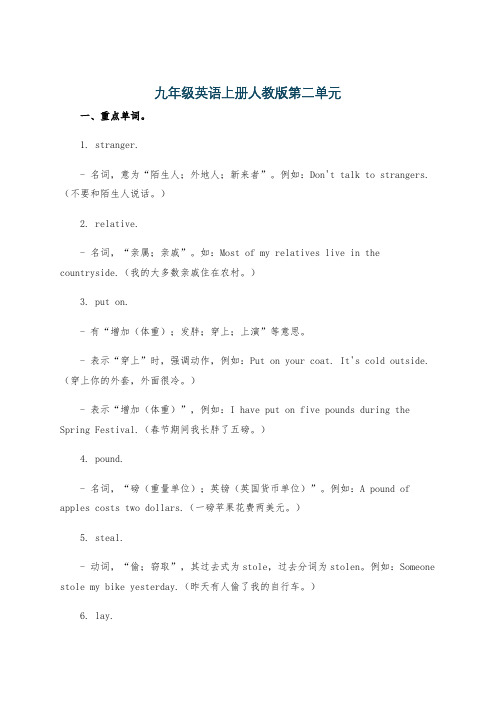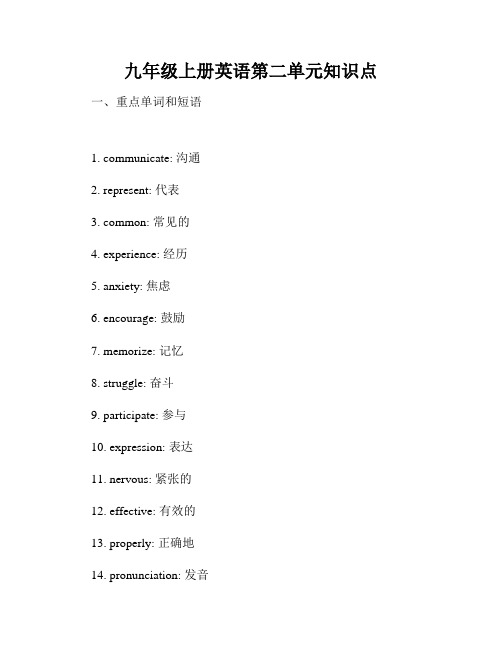九年级英语第二单元
- 格式:doc
- 大小:62.00 KB
- 文档页数:4

九年级人教版英语第二单元单词单词音标词性。
mooncake ['mu:nkeɪk]n.月饼。
lantern ['læntən]n.灯笼。
stranger ['streɪndʒə(r)]n.陌生人。
relative ['relətɪv]n.亲属;亲戚。
put on [pʊt ɒn]增加(体重);发胖。
pound [paʊnd]n.磅(重量单位);英镑(英国货币单位)folk [fəʊk]adj.民间的;民俗的 n.人们。
goddess ['gɒdes]n.女神。
steal [sti:l]v. (stole [stəʊl], stolen ['stəʊlən])偷;窃取。
lay [leɪ]v. (laid [leɪd], laid)放置;安放;产(卵);下(蛋)lay out [leɪ aʊt]摆开;布置。
dessert [dɪ'zɜ:t]n.(饭后)甜点;甜食。
garden ['gɑ:dn]n.花园;园子。
admire [əd'maɪə(r)]v.欣赏;仰慕。
tie [taɪ]n.领带 v.捆;束。
haunted ['hɔ:ntɪd]adj.有鬼魂出没的;闹鬼的。
ghost [gəʊst]n.鬼;鬼魂。
trick [trɪk]n.花招;把戏。
treat [tri:t]n.款待;招待v.招待;请(客)spider ['spaɪdə(r)]n.蜘蛛。
Christmas ['krɪsməs]n.圣诞节。
fool [fu:l]n.蠢人;傻瓜 v.愚弄 adj.愚蠢的。
lie [laɪ]v. (lay [leɪ], lain [leɪn])平躺;处于。
novel ['nɒvl]n.(长篇)小说。
eve [i:v]n.(尤指宗教节假日的)前夕;前夜。
bookstore ['bʊkstɔ:(r)]n.书店。

九年级英语上册人教版第二单元一、重点单词。
1. stranger.- 名词,意为“陌生人;外地人;新来者”。
例如:Don't talk to strangers.(不要和陌生人说话。
)2. relative.- 名词,“亲属;亲戚”。
如:Most of my relatives live in the countryside.(我的大多数亲戚住在农村。
)3. put on.- 有“增加(体重);发胖;穿上;上演”等意思。
- 表示“穿上”时,强调动作,例如:Put on your coat. It's cold outside.(穿上你的外套,外面很冷。
)- 表示“增加(体重)”,例如:I have put on five pounds during the Spring Festival.(春节期间我长胖了五磅。
)4. pound.- 名词,“磅(重量单位);英镑(英国货币单位)”。
例如:A pound of apples costs two dollars.(一磅苹果花费两美元。
)5. steal.- 动词,“偷;窃取”,其过去式为stole,过去分词为stolen。
例如:Someone stole my bike yesterday.(昨天有人偷了我的自行车。
)6. lay.- 动词,“放置;安放;产(卵);下(蛋)”,其过去式为laid,过去分词为laid。
例如:The hen lays an egg every day.(这只母鸡每天下一个蛋。
)- 区别于lie(躺;位于),lie的过去式为lay,过去分词为lain。
7. dessert.- 名词,“(饭后)甜点;甜食”。
例如:Ice - cream is my favorite dessert.(冰淇淋是我最喜欢的甜点。
)8. garden.- 名词,“花园;园子”。
例如:There are many beautiful flowers in the garden.(花园里有许多美丽的花朵。

九年级上册英语第二单元知识点一、重点单词和短语1. communicate: 沟通2. represent: 代表3. common: 常见的4. experience: 经历5. anxiety: 焦虑6. encourage: 鼓励7. memorize: 记忆8. struggle: 奋斗9. participate: 参与10. expression: 表达11. nervous: 紧张的12. effective: 有效的13. properly: 正确地14. pronunciation: 发音15. progress: 进步二、重点语法1. 一般现在时:表示经常性、习惯性的动作或事实。
例如:She always gets up early.2. 现在进行时:表示现在进行的动作。
例如:They are playing basketball now.3. 一般过去时:表示过去发生的动作或状态。
例如:I saw a movie yesterday.4. 过去进行时:表示过去某一时刻正在进行的动作。
例如:She was studying when I called her.5. 一般将来时:表示将来要发生的动作或事件。
例如:We will visit Beijing next month.三、重点句型1. How do you communicate with your friends?你是如何与你的朋友沟通的?2. I usually talk to them on social media.我通常在社交媒体上与他们交谈。
3. English is important for communication.英语对于沟通来说很重要。
4. I have some experience in learning English.我在学习英语方面有一些经验。
5. Don't be nervous and just enjoy the process.不要紧张,尽情享受这个过程。

九年级上册英语第二单元重点短语1. I usually go to school by bus.2. She often plays basketball with her friends.3. They always do their homework after dinner.4. We sometimes watch movies on weekends.5. He seldom eats junk food.6. I rarely go out during the week.7. She never forgets to call her parents.8. Could you please help me with this?9. I am looking forward to the summer vacation.10. It's important to stay healthy.11. I need to study for the test tomorrow.12. Are you interested in playing football?13. They are good at speaking English.14. She spends a lot of time reading books.15. We enjoy going to the park on sunny days.16. He takes care of his little sister.17. I am proud of my achievements.18. Can you tell me how to get there?19. They would like to join the club.20. She is excited about the upcoming trip.21. I can't wait to see my friends again.22. He is responsible for his own learning.23. We should try to help each other.24. I think it's a good idea to volunteer.25. She decided to learn a new language.26. I like listening to music while studying.27. They often go hiking in the mountains.28. He is good at solving math problems.29. I prefer working in a team.30. We have to respect different opinions.31. She is always willing to lend a hand.。

第二单元单词学习第一部分:基础单词1. aunt - a.父母的姐妹或妹妹2. uncle - n.父母的哥哥或姐夫3. cousin - n.堂兄弟/堂姐妹4. grandmother - n.祖母5. grandfather - n.祖父6. nephew - n.侄子7. niece - n.侄女8. relative - n.亲戚9. family - n.家庭10. celebrate - v.庆祝11. festival - n.节日12. holiday - n.假日13. occasion - n.场合14. traditional - a.传统的15. custom - n.习俗第二部分:动词1. interview - v.面试2. prepare - v.准备3. assist - v.帮助4. share - v.共享5. invite - v.邀请6. decorate - v.装饰7. exchange - v.交换8. remember - v.记得9. celebrate - v.庆祝第三部分:形容词1. traditional - a.传统的2. annual - a.每年的3. festive - a.喜庆的4. modern - a.现代的5. special - a.特别的6. traditional - a.传统的7. colorful - a.多彩的8. joyful - a.快乐的9. exciting - a.刺激的第四部分:名词1. celebration - n.庆祝活动2. tradition - n.传统3. culture - n.文化4. festivity - n.庆祝活动5. ceremony - n.仪式6. reunion - n.团聚7. gift - n.礼物8. symbol - n.象征9. harmony - n.和谐第五部分:短语1. have a family party - 举办家庭聚会2. a big family dinner - 大家庭晚宴3. give and receive gifts - 送礼物和接受礼物4. wear traditional clothes - 穿传统服饰第六部分:句子1. My aunt and uncle areing to visit us this weekend. - 这个周末,我舅舅和阿姨要来看我们。

人教版九年级英语第二单元知识点总结一、重点词汇解析1.mooncake /ˈmuːnkeɪk/ 月饼-解析:由moon(月亮)和cake(蛋糕)组成,是中秋节的传统食品。
-例句:We eat mooncakes on Mid-Autumn Festival.(我们在中秋节吃月饼。
)ntern /ˈlæntən/ 灯笼-解析:一种照明工具,通常在节日中使用。
-例句:There are many beautiful lanterns in the park.(公园里有很多漂亮的灯笼。
)3.stranger /ˈstreɪndʒə(r)/ 陌生人-解析:不认识的人。
-例句:Don't talk to strangers.(不要和陌生人说话。
)4.relative /ˈrelətɪv/ 亲属;亲戚-解析:和自己有血缘或婚姻关系的人。
-例句:We visited our relatives during the holiday.(我们在假期拜访了亲戚。
)5.put on 增加(体重);发胖-解析:指身体的重量增加。
-例句:She has put on some weight.(她长胖了一些。
)y /leɪ/ 放置;安放;产(卵);下(蛋)-解析:过去式和过去分词分别为laid /leɪd/。
-例句:She laid the book on the table.(她把书放在桌子上。
)二、重点短语1.the Water Festival 泼水节-解析:一些国家和地区的传统节日。
-例句:The Water Festival is very lively.(泼水节非常热闹。
)2.the Dragon Boat Festival 端午节-解析:中国的传统节日,有赛龙舟、吃粽子等习俗。
-例句:We eat zongzi on the Dragon Boat Festival.(我们在端午节吃粽子。
)3.the Spring Festival 春节-解析:中国最重要的传统节日。
九年级英语知识点第二单元第二单元: 九年级英语知识点1. 时态与语态 (Tenses and Voice)在英语语法中,动词时态和语态的正确运用是非常重要的。
以下是九年级学生在第二单元应该了解的时态和语态知识点:1.1 一般现在时 (Simple Present Tense)一般现在时用于表示经常性或普遍性的动作、情况或习惯。
它的结构是“主语 + 动词原形”。
例句:- She plays the piano every day. (她每天弹钢琴。
)- They live in a big house. (他们住在一所大房子里。
)1.2 一般过去时 (Simple Past Tense)一般过去时用于表示过去某个时间发生的动作或状态。
它的结构是“主语 + 动词过去式”。
例句:- He studied English last night. (他昨晚学习了英语。
)- We went to the beach last summer. (去年夏天我们去海滩了。
)1.3 一般将来时 (Simple Future Tense)一般将来时用于表示将来发生的动作或情况。
它的结构是“主语 + will + 动词原形”。
例句:- I will visit my grandparents this weekend. (这个周末我会去看望我的祖父母。
)- They will have a party for their anniversary. (为了他们的周年纪念,他们将会举办一个聚会。
)1.4 现在进行时 (Present Continuous Tense)现在进行时用于表示现在正在进行的动作。
它的结构是“主语 + am/is/are + 动词的ing形式”。
例句:- She is studying for her exam at the moment. (她此刻正在为考试而学习。
)- They are playing soccer in the park. (他们正在公园里踢足球。
九年级全一册英语书第二单元笔记要说这九年级全一册的英语书第二单元,那可真是让我又爱又恨。
这一单元的知识点就像一群调皮的小精灵,总是在我脑袋里蹦跶,有时候还会捉迷藏,让我好找!翻开这第二单元的课本,满眼都是密密麻麻的单词、短语和语法。
那些单词啊,有的长得奇奇怪怪,发音也拗口得很。
就比如说“lantern”这个单词,意思是灯笼,可我最初怎么记都记不住,总是读成“lanteng”,搞得我自己都哭笑不得。
笔记里有一个关于宾语从句的知识点,那可真是让我费了好大的劲儿。
老师在黑板上不停地写啊讲啊,我在下面手忙脚乱地记。
什么陈述句语序啦,引导词的用法啦,还有时态的呼应,听得我脑袋都快变成浆糊了。
我记得当时老师举了个例子:“I know that he is a good student.”然后问我们这个句子里的宾语从句是哪一部分。
我心里想着:“这谁不知道啊,不就是‘that he is a good student’嘛。
”可当老师叫我起来回答的时候,我这嘴巴就像被胶水粘住了一样,愣是一个字也吐不出来,脸瞬间就红得像个熟透的苹果。
还有那些短语,“put on”“dress up”“be similar to”等等,看着简单,用起来可容易出错。
有一次做作业,有一道题是“她穿上了新衣服”,我想都没想就写了“She dresses up the new clothes.”结果被老师批了个大大的叉,正确的应该是“She puts on the new clothes.” 哎呀,就因为这一个短语,那道题的分就丢了,我真是懊悔得不行。
这单元里的语法点不仅在作业里给我找麻烦,在考试的时候更是让我紧张得手心出汗。
记得有一次月考,有一道选择题就是关于宾语从句的时态问题。
我盯着那四个选项,感觉每个都长得差不多,心里不停地念叨着老师讲过的那些规则,可脑子就像短路了一样,纠结了半天最后还是选错了。
考试结束后,我和同桌对答案,发现自己错了这道题,心里那个郁闷啊,就像堵了一块大石头。
九年级上册英语第二单元知识点梳理1. 词汇本单元主要涉及以下词汇:- appliance - 家用电器- behavior - 行为- daily routine - 日常事务- electronic device - 电子设备- etiquette - 礼仪- household chores - 家务事- manage - 管理- responsibility - 责任- schedule - 日程安排- task - 任务2. 语法本单元涉及以下语法知识:- 现在进行时:用于描述正在进行的动作或状态。
- 句型结构:主语 + am/is/are + 动词 + -ing。
例如:- I am watching a movie now.- She is studying for the test.- They are playing football in the park.3. 口语表达在本单元中,我们研究了一些日常生活中的口语表达。
- How do you manage your time? - 你是如何管理时间的?- What are your daily responsibilities? - 你的日常责任是什么?- Can you help me with this task? - 你能帮我做这个任务吗?- I need to do my household chores. - 我需要做家务事。
- It's important to have good etiquette. - 有良好的礼仪很重要。
4. 情景对话本单元涉及以下情景对话:1. 在朋友家拜访的对话2. 家庭成员分担家务的对话3. 大家分享日常事务的对话4. 讨论日程安排的对话通过这些情景对话,我们可以研究如何运用所学的语言知识来进行实际交流。
以上是九年级上册英语第二单元的知识点梳理。
希望对你的学习有所帮助!。
九年级上册英语第二单元知识点总结九年级上册英语第二单元知识1Unit2Ithinkthatmooncakesaredelicious!【重点】1.puton增加(体重);发胖2.careabout关心;在乎endup最终成为,最后处于notonly……butalso……不但……而且……5.shootdown射下edtodo过去常常做……7.remindsb.of使某人想起8.giveout分发发放thewaterfestival泼水节theChinesespringfestival中国11.nextyear明年12.soundlike听起来像13.eachother互相彼此14.intheshapeof以……的形状15.onmid-autumnnight在中秋之夜16.flyupto飞向Mother’sdaymoreandmorepopular越来越受欢迎22.thinkof想起;认为;思考dressup装扮穿上盛装theimportanceof……的重要性25.makemoney挣钱26.inneed需要帮助处于困境中27.between…and…在……和……之间28.thedragonboatfestival龙舟节29.thelanternfestival30.likebest最喜欢31.goto…foravacation去……度假32.besimilarto与……相似33.washaway冲走洗掉34.Mid-autumnfestival35.shootdown射下callout大声呼喊thetraditionof……的传统38.atnight在夜里;在晚上one…,theother…一个……,另一个…...Father’sday【重点句型】Ithinkthatthey’refuntowatch.我认为它们看着很有意思。
Whatdoyoulikeabout…?WhatdoyoulikebestabouttheDragonBoatFestival?关于,你最喜欢什么?Whatagreatday!多么美好的一天!4.1wonderif…Iwonderifit’ssimilartotheWaterFestivaloftheDaipeopleinYunnanProvince.我想知道它是否与云南傣族的泼水节相似。
人教版九年级英语第二单元重点短语、重点句型总结重点短语
1.put on 增加(体重);发胖
2.care about 关心; 在乎
3.end up 最终成为,最后处于
4.not only ……but also……不但……而且……
5.shoot down 射下
ed to do 过去常常做……
7.remind sb. of 使某人想起
8.give out 分发发放
9.the water festival 泼水节
10.the Chinese spring festival 中国春节
11.next year 明年
12.sound like 听起来像
13.each other 互相彼此
14.in the shape of 以……的形状
15.on mid-autumn night 在中秋之夜
16.fly up to 飞向
y out 摆开布置
e back 回来
19.as a result 结果因此
20.Mother’s day 母亲节
21.more and more popular 越来越受欢迎
22.think of 想起;认为;思考
23.dress up 装扮穿上盛装
24.the importance of ……的重要性
25.make money 挣钱
26.in need 需要帮助处于困境中
27.between …and…在……和……之间
28.the dragon boat festival 龙舟节
29.the lantern festival 元宵节
30.like best 最喜欢
31.go to …for a vacation 去……度假
32.be similar to 与……相似
33.wash away 冲走洗掉
34.Mid-autumn festival 中秋节
35.shoot down 射下
36.call out 大声呼喊
37.the tradition of ……的传统
38.at night 在夜里; 在晚上
39.one…,the other…一个……,另一个…...
40.Father’s day 父亲节
重点句型
1. I think that they’ re fun to watch.
我认为它们看着很有意思。
2. What do you like about… ?
What do you like best about the Dragon Boat Festival?
关于端午节,你最喜欢什么?
3. What a great day!
多么美好的一天!
4 .1 wonder if…
I wonder if it’s similar to the Water Festival of the Dai people in Yunnan Province.
我想知道它是否与云南傣族的泼水节相似。
5. How+adj. /adv. + 主+ 谓!
How fantastic the dragon boat teams were!
龙舟队多棒啊!
6.What + 名词+主语+谓语!
What an interesting book it is!。